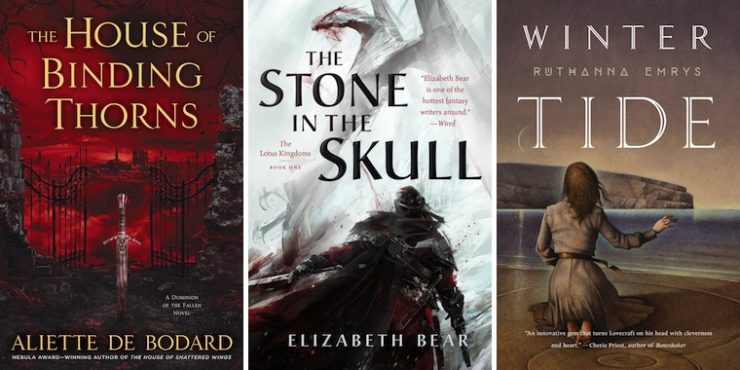It’s the time of year when thoughts turn to the Hugo Awards. Those of us able to nominate stare at several categories with the terrifying certainty that we haven’t read widely enough (or watched widely enough) to begin to have an informed opinion.*
So I thought I’d share with you some of the things I intend to nominate in the fiction categories, just in case anyone feels like they want to discuss literary merits vs. popularity in non-juried awards. I’m not going to share more than two or three things in a category: these are as much ideas for discussion as they are recommendations. There’s so much out there that’s good that even a much longer list will exclude some amazing work.
For the Best Short Story category, I think my favourite short story from last year was Max Gladstone’s “The Scholast in the Low Waters Kingdom,” published here on Tor.com. It reminds me a little of Mary Gentle’s (not very well known) White Crow stories, and a little of Iain Banks’ Culture, and a little of Ann Leckie, while being very much itself: a short story about ethics and loyalty and science fiction told with utmost precision of prose and emotion.
I also really liked Ursula Vernon’s “The Dark Birds” in Apex. I don’t read a lot of short fiction, at least not at the short story length, so I have very specific likes and dislikes.
For the Best Novelette category, I have to tell you, I’m pretty torn. Between J.Y. Yang’s “Waiting on a Bright Moon” (Tor.com), a science-fantastical story of power, revolution, and human connection; Aliette de Bodard’s “Children of Thorns, Children of Water” (Uncanny), which combines a baking competition with espionage in a decaying, gothic Paris full of Fallen angels, magic, and torn loyalties; and Elizabeth Bear’s “The King’s Evil” (The Book of Swords), where, in the best modern traditions of sword-and-sorcery, an unlikely pair of adventurers have a problem to solve on a tropical island filled with magic and peril—to pick my favourite out of these three is outright impossible. They’re all really good, and I’m glad that the Hugo process allows me to nominate up to five titles.
Best Novella is another impossible category. Impossible, at least, if I were picking just one. Ellen Klages’ Passing Strange, a compelling story of love and community between women in 1930s San Francisco, and Cynthia Ward’s The Adventure of the Incognita Countess, a story much influenced by 19th century literature that involves vampires, spies, trans-Atlantic passenger liners in the 1910s, and emotionally tangled relationships—these stories are both very close to my heart, not least because they’re excellent and queer. But J.Y. Yang’s The Red Threads of Fortune? Not only a tight story in a fantastic setting with great characters, but it has flying beasts and riding lizards… so I’m probably going to call it my favourite.
This brings us to Best Novel as a category. Novels are hard. I’ve read a lot of them, and even narrowing down my nominations to five for myself was a terrible exercise in self-control and decision-making. To offer a number smaller than five for discussion here? Ouch.
But my top pick is Aliette de Bodard’s glorious, gorgeous, complex and precisely-layered The House of Binding Thorns. This is a novel of loyalty and betrayal, the families—and the communities—you make and the ones you leave behind, the chains you accept and the chains that you refuse. Set in a very gothic Paris, in the aftermath of magical catastrophe—in a long, lingering decline—it is a story that grips my heart, one that makes me think deeper and feel harder every time I return to it.
Other contenders for the top spot out of my year in novels? Let’s just mention two. Elizabeth Bear’s The Stone in the Skull marries the best of sword-and-sorcery to the broad canvass of epic, with compelling characters, a fascinating setting, and prose that glitters in precision. And Ruthanna Emrys’s debut novel Winter Tide reimagines a Lovecraftian universe from the point of view of Lovecraft’s monsters: a novel about family, about survival, about genocide and about rebuilding within systems of power that seek to shut you out. It’s a kind book, and a powerful one.
These are some of the works I’m thinking about when it comes to nominating for the Hugos. What are you thinking about?
*As ever, Best Dramatic Short Form stumps me, as does Best Graphic. Best Podcast, too. My book Sleeping With Monsters is eligible for Best Related Work, but I haven’t been reading widely enough to have a good feel for what else is out there.
Liz Bourke is a cranky queer person who reads books. She holds a Ph.D in Classics from Trinity College, Dublin. Her first book, Sleeping With Monsters, a collection of reviews and criticism, is out now from Aqueduct Press. Find her at her blog, where she’s been known to talk about even more books thanks to her Patreon supporters. Or find her at her Twitter. She supports the work of the Irish Refugee Council and the Abortion Rights Campaign.










